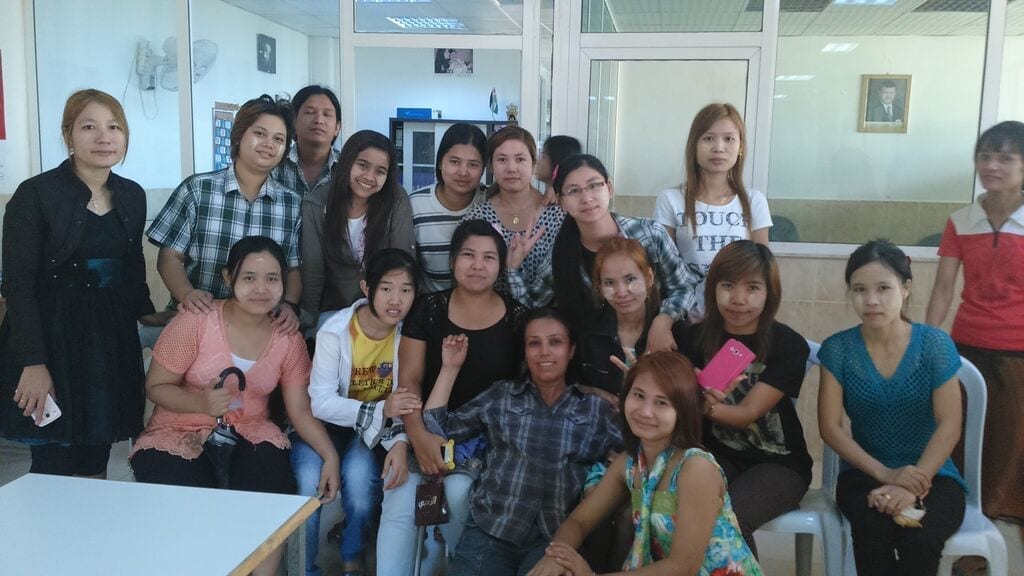
Oct 20, 2015
The “Made in Jordan” label is familiar to U.S. consumers shopping for shirts, jeans and other clothes. Mervat Jumhawi, a Jordanian union organizer, is actively ensuring the largely migrant workforce that cuts and sews these garments does so in safe conditions, receives fair wages and is treated with respect on the job.
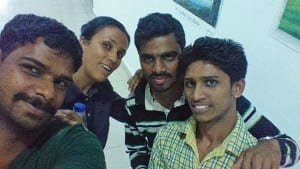
Mervat Jumhawi in a selfie wih Indian textile workers. Photo courtesy Mervat Jumhawi
“I was a garment worker and I know what exploitation is, I knows what that means,” says Jumhawi. After working 13 years in textile factories, Jumhawi spent six years on the board of the General Trade Union of Workers in Textile, Garment and Clothing Industries, where she served until recently. The union represents all 55,000 textile workers throughout Jordan, including migrant workers who comprise 71 percent of the country’s garment factory workforce.
Garment exports, produced primarily for the United States, account for some 20 percent of the country’s gross domestic product, with factories located in the Sahab, Dulail and Ramtha industrial zones.
“In the beginning, I was not familiar with migrant worker issues,” Jumhawi says, speaking through a translator. “But after I worked with migrant workers, I was more interested in their issues because they are more marginalized and vulnerable.”
Migrant Worker Exploitation Begins in the Home Country
Exploitation of migrant workers in Jordan and other countries around the world often begins in their home countries, where they typically pay huge fees to labor brokers for a job. Indebted when they start their employment, migrant workers often endure abusive conditions to pay off their loans. Employers also may confiscate passports, effectively holding migrant workers hostage and unable to leave if they are not paid or if they experience verbal or physical abuse. Jumhawi helps raise workers’ awareness of their rights under the law and assists workers who are not receiving health care, who have been abused or otherwise need assistance making their way through the legal system.
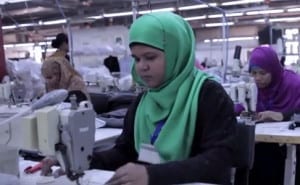
More than 70 percent of migrant textile workers in Jordan are women. Credit: Solidarity Center
More than 70 percent of migrant textile workers in Jordan are women, primarily from Bangladesh, Sri Lanka and Myanmar. Jumhawi’s one-on-one assistance with garment workers and her dedication to improving their working conditions—she spent 40 days and nights with 1,300 striking Burmese garment workers—has generated tremendous trust among the workers.
In one instance, when Bangladesh and Sri Lankan workers went on strike in 2013, Jumhawi tried to speak with managers, but they would not let her in the factory. As she left, she looked back, and saw hundreds of workers following her. Her challenge to management gave the workers strength, she said. Seeing the workers take off with Jumhawi in the lead, managers ultimately negotiated—but not until Jumhawi had talked with each worker to hear specific grievances.
Solidarity Center Support Assists Migrant Workers
The Solidarity Center provided support over the past year for the migrant outreach project among textile workers, holding trainings on combating labor trafficking and exploitation through collective worker action. Workers were encouraged to form committees to monitor labor rights violations and refer them to the union resolution.
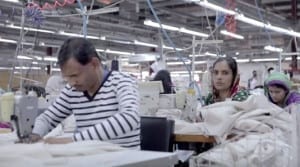
Of the 55,000 textile workers in Jordan, 71 percent are migrant workers. Credit: Solidarity Center
Over the years, the Solidarity Center also has worked closely with the garment workers union, and in May 2013, the union negotiated a contract with employers that covers all textile workers, including migrant workers. The contract set up health and safety committees, requires employer pay for transportation and food and prohibits labor recruiters in origin countries from charging fees to workers.
“Our union is keen on migrant worker issues from the moment they arrive in Jordan,” says Fathalla Al Omrani, garment workers’ union president.
Migrant workers are housed in employer-owned dormitories, which often fail to meet safety and health standards, according to Sara Khatib, a Jordan-based Solidarity Center program office for anti-trafficking initiatives. The contract requires employers follow Ministry of Health standards for living conditions, such as not overcrowding workers in a room.
“We were 10 to 12 women living in one room,” says one garment worker. “After the inspectors visit, the numbers decreased to six or seven.”
‘I Will Struggle for Migrant Workers to the End’
Supervisors yell at the workers if they don’t reach the production target and may deduct pay or even deport them, says Jumhawi. Such actions violate Jordan’s labor laws and the union contract.
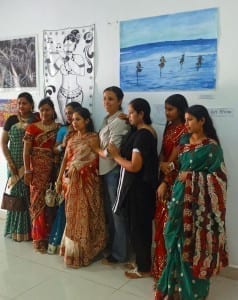
Mervat (center), joins women from Bangladesh, the largest group of migrant workers in Jordan’s textile industry. Photo courtesy Mervat Jumhawi
Jumhawi has been instrumental in helping workers enforce the contract and seek justice under Jordan’s labor laws. She also recently assisted with production of a video documenting migrant workers’ struggles in Jordan and the role of union strength in helping workers achieve their goals. When asked about her most important victories, she says she counts “every single and small achievement,” as a major success, “even helping a worker with a small thing.”
“Mervat is very close to the workers and they all trust her,” says Khatib, who works closely with Jumhawi. “She follows up on the workers’ cases seriously and she deeply cares about them. She’s a hard working woman and a real unionist.”
Jumhawi works 12 hour days, seven days a week, unless she is too tired or sick, she says. Sometimes the long hours and tough demands make her want to leave the job. But she changes her mind when she thinks of the workers.
“I will struggle for migrant workers to the end, and I encourage all workers, especially women, to become unionists. When I became member of the union, I became stronger.”
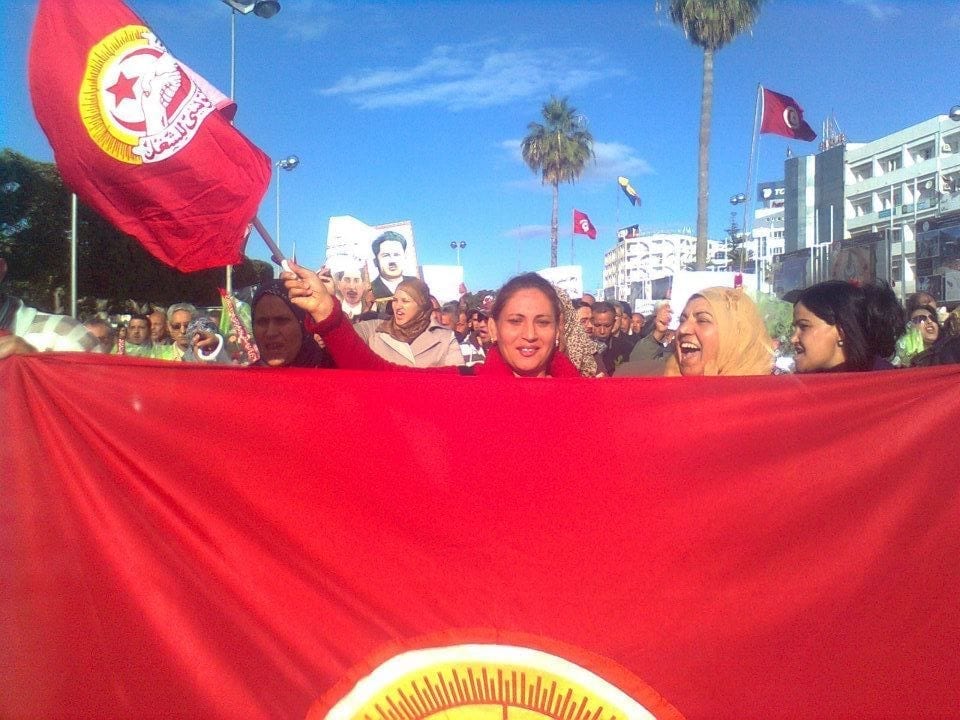
Oct 9, 2015
For its role in brokering a peaceful path to democracy, Tunisia’s labor movement today was named a co-recipient of the Nobel Peace Prize.
The Nobel Committee recognized the Tunisian National Dialogue Quartet—comprised of longtime Solidarity Center ally the Tunisian General Labor Union (UGTT), the Tunisian Confederation of Industry, Trade and Handicrafts, the Tunisian Human Rights League and the Tunisian Order of Lawyers—for establishing “an alternative, peaceful political process at a time when the country was on the brink of civil war.”
The Quartet, formed in 2013, was “instrumental in enabling Tunisia, in the space of a few years, to establish a constitutional system of government guaranteeing fundamental rights for the entire population, irrespective of gender, political conviction or religious belief,” Nobel Committee Chairman Kaci Kullmann Five said at the presentation ceremony.
“This is a great joy and pride for Tunisia, but also a hope for the Arab World,” UGTT chief Houcine Abassi told Reuters. “It’s a message that dialogue can lead us on the right path. This prize is a message for our region to put down arms and sit and talk at the negotiation table.”
In 2012, the UGTT received the AFL-CIO’s 2012 George Meany-Lane Kirkland Human Rights Award along with the labor federation of Bahrain, the General Federation of Bahrain Trade Unions, for their mobilization of thousands of people in their countries to carry forward a message of social justice during the popular uprisings that swept the Middle East in 2010 and 2011.
This is the second year in a row that worker rights activists have been honored with a Nobel Peace Prize. Last year Kailash Satyarthi, head of the Global March against Child Labor, also a Solidarity Center ally, shared the prize with girls’ education activist Malala Yousafzai.
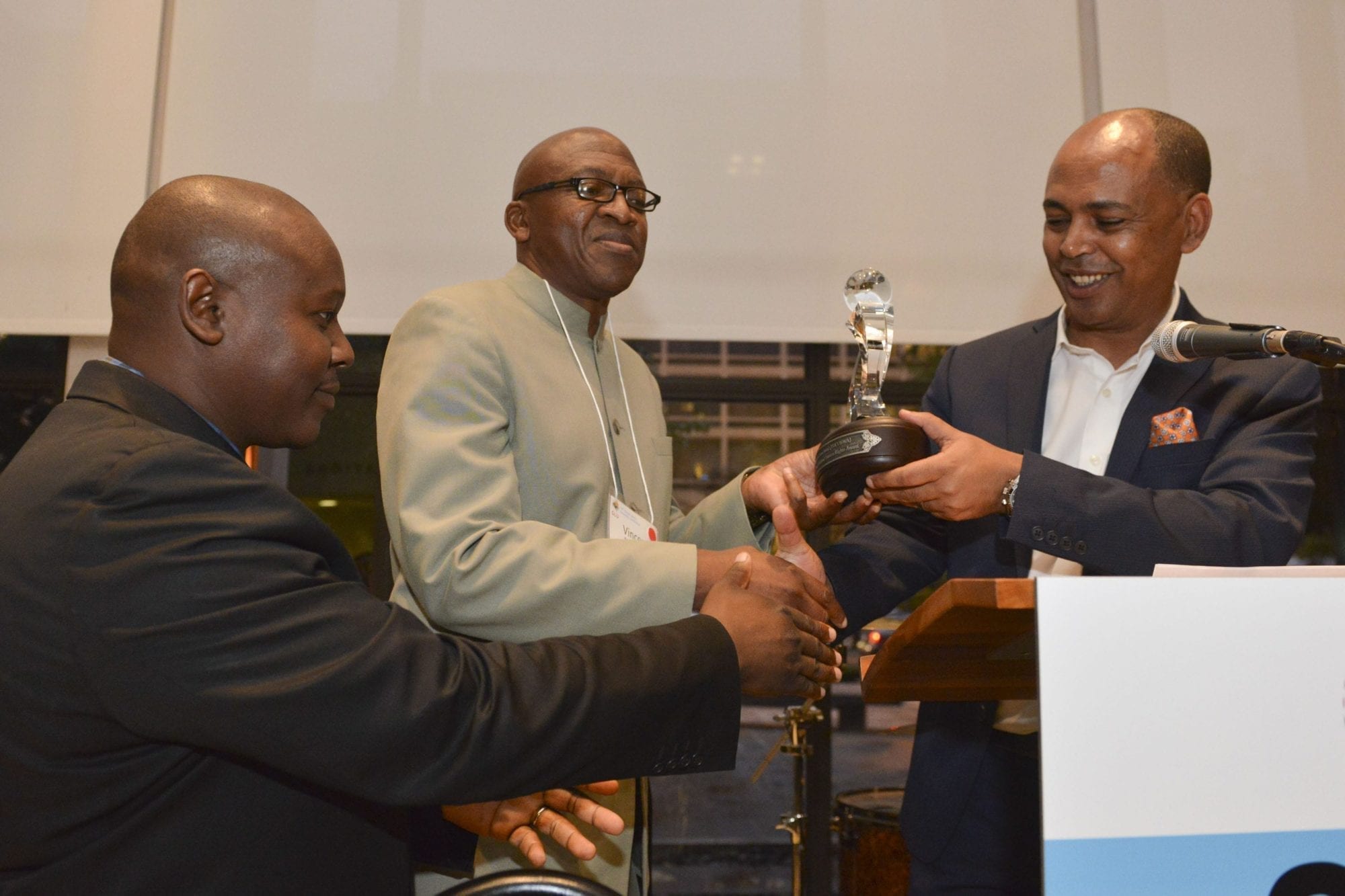
Oct 2, 2015
Over the past year, Swazi workers have not been deterred from taking part in union meetings even though the gatherings were repeatedly broken up by police. They turned out in large numbers for the annual May Day rally, although they were threatened with arrest if they did so. And they took all these actions in an environment in which unions were banned and free speech squelched.
For their bravery in standing up for their rights, Swazi workers and their union, the Trade Union Congress of Swaziland (TUCOSWA), last night received the AFL-CIO’s 2015 George Meany-Lane Kirkland Human Rights Award, which recognized “the courage and persistence of Swaziland’s workers in demanding their rights,” the AFL-CIO said in a statement announcing the award.
More than 200 union allies and supporters, including participants of the Global Labor University conference, packed the AFL-CIO lobby in Washington, D.C., for the honors ceremony, with TUCOSWA Secretary General Vincent Ncongwane and TUCOSWA Treasurer General Patrick Mamba accepting the award on behalf of the union and Swazi workers.
“Labor never quits,” Ncongwane said, accepting the award. “We never give up the fight, no matter how tough the odds, no matter how long it takes,” he said, quoting former AFL-CIO President George Meany.
“You’re truly global leaders for the struggle for justice,” said AFL-CIO Executive Vice President Tefere Gebre as he presented the award.
Speaking at the event, Jos Williams, president of the AFL-CIO Metropolitan Washington Labor Council, described his experience as part an International Trade Union Confederation (ITUC) fact-finding delegation to Swaziland in May. Members of the delegation were moved to tears during their meeting with families of imprisoned human rights leaders, Williams said.
“I saw tough freedom fighters with tears in their eyes once they heard from their families.”
TUCOSWA was formed in 2012 with the merger of the Swaziland Federation of Trade Unions and the Swaziland Federation of Labor. Both were joined by the Swaziland National Association of Teachers. TUCOSWA only received official recognition this past May, after the U.S. government suspended trade benefits with the country last year and made worker rights a key component of restoring its trade eligibility.
Since the U.S. government suspended Swaziland’s participation in the African Growth and Opportunity Act (AGOA), the country also has freed imprisoned human rights advocates but it has not yet repealed anti-terrorism laws that enable it to imprison union leaders and others who call for human rights and democracy.
At a briefing on working conditions in Swaziland at the Solidarity Center, Ncongwane noted that the loss of trade benefits has impacted thousands of workers, especially in the textile sector, who have been laid off.
Speaking last night, Ncongwane said “we are working tirelessly to press for reforms that will put our country on a more secure footing to restore these jobs and to restore job opportunities. The greatest threat to jobs and growth in Swaziland does not come from unions, but from our government’s lack of foresight, lack of vision and mismanaged policy decisions.”
Ncongwane emphasized the positive impact of global labor solidarity which, in publicizing the government’s actions, has enabled the union to operate with some measure of freedom.
“We will utilize our institutional strength to impact and press for change but we need our international partners in the global labor movement to maintain support for workers’ rights and for greater democracy in Swaziland, especially now when we are as close as we’ve ever been to real reform in years,” he said.
The annual Meany-Kirkland award, created in 1980 and named for the first two presidents of the AFL-CIO, recognizes outstanding examples of the international struggle for human rights through trade unions.
Last year, the Building and Wood Workers’ International (BWI) and its affiliates received the award and the International Domestic Workers Federation (IDWF) received it in 2013. In 2012, the award went to the Tunisian General Union of Labor (UGTT) and the General Federation of Bahrain Trade Unions (GBFTU)—two unions whose struggles were emblematic of labor’s role in the uprisings that year.
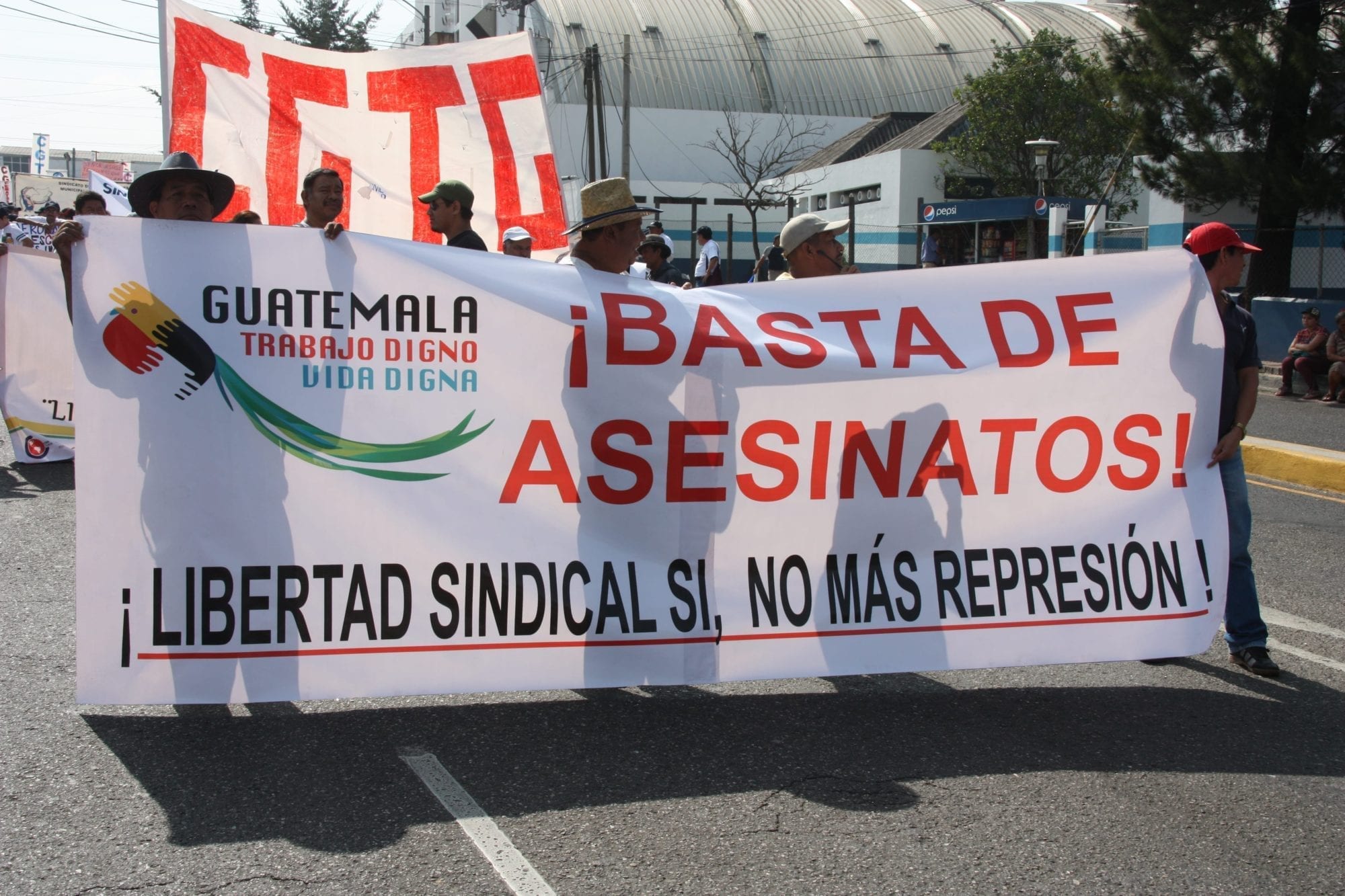
Oct 1, 2015
Mynor Rolando Ramos Castillo, a municipal worker in Jalapa, a city in southeast Guatemala, was shot and killed in front of his home over the weekend. His family detained the killer and turned him into the police. The killer confessed to accepting the hit for 1,500 quetzales (roughly $195).
Ramos Castillo was a union activist with the Sindicato de Trabajadores de la Municipalidad de Jalapa (SITRAMJ), the city workers’ union, and was among 183 workers disputing illegal termination who had won a labor court’s order of reinstatement. Ramos Castillo had been laid off, reinstated to his job and laid off again within the past two years, and was waiting for the city’s mayor to comply with the order to reinstate the workers and pay them back wages. Union leaders say Ramos Castillo and other laid-off city workers were targeted and harassed by city officials because they were active union members. He is the sixth member of his union to be assassinated.
70 Union Members Killed Since 2007
Ramos Castillo is the first union activist murdered this year in Guatemala, where some 70 worker activists have been killed since 2007. Last year, transport union leader Luis Arnoldo Lόpez Esteban was murdered in Jutiapa in May. Marlon Dagoberto Vásqez Lόpez, 19, a member of the young trade unionists’ network and the construction workers’ union, a Solidarity Center ally, was murdered in January 2014.
This year, Guatemalans waged months of public demonstrations, turning out in nearly unprecedented numbers to demand transparency, democracy, accountability and access to justice. As a result, in September, President Otto Perez Molina was forced to step down and arrested, and more than 15 high-ranking government officials have been implicated in a widening corruption scandal. At local government levels, municipal workers say pervasive corruption results in routine wage theft, harassment of workers organizing to improve their workplaces and illegal terminations and reprisals.
Despite ongoing violence against union members—murder, torture, kidnappings, break-ins and death threats—few perpetrators are brought to justice. In an unprecedented move, the U.S. government last year agreed to take Guatemala to international arbitration for violating worker rights under the U.S.-Central American Free Trade Agreement (CAFTA).
The action was the first time that a country has sought international arbitration against another for a violation of labor standards and followed Guatemala’s failure to implement an 18-point enforcement plan to address worker rights violations. The case first arose in 2008, when six Guatemalan unions and the AFL-CIO filed a complaint with the U.S. Office of Trade.
Guatemala, Honduras Not Complying with Trade Provisions
Similarly in Honduras, where this year one union leader was murdered, another forcibly disappeared and presumed dead, and several others threatened and harassed, union activists say their government is not complying with CAFTA provisions. In March 2012, the AFL-CIO and 26 Honduran unions and civil society organizations filed a complaint under CAFTA’s labor chapter, which the U.S. Department of Labor’s Office of Trade and Labor Affairs accepted in 2014. In a February 2015 report, the U.S. Trade and Labor Affairs office said Honduras has made virtually no progress since then.
In denouncing Ramos Castillo’s murder, the Confederaciόn de Unidad Sindical de Guatemala (CUSG) said it would submit the case to the International Labor Organization (ILO)’s Administrative Tribunal. The tribunal is meeting in November to discuss charges that Guatemala is not complying with ILO standards the country ratified, including Convention 87, the Freedom of Association and Protection of the Right to Organize.
The CUSG also echoed the International Trade Union Confederation call for creation of an ILO Commission of Inquiry to “help to open up needed space for debate and consultation” because “the government has no effective preventative mechanisms in place to protect workers from acts of violence or to credibly and effectively investigate and prosecute those responsible.” The ILO sets up an Inquiry Commission when a member state is accused of committing persistent and serious violations and repeatedly has refused to address them.
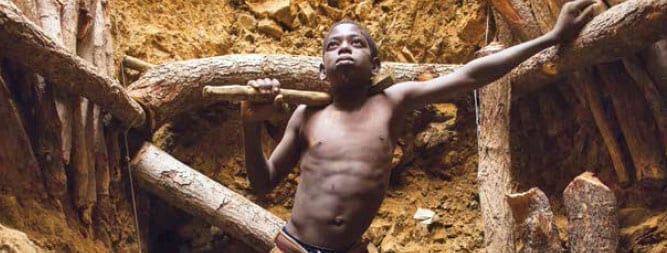
Oct 1, 2015
Karim Sawadogo is young enough to count his age on his hands, but instead he uses them to hack away at the dry, yellow earth in the hazardous mine shafts where he works in Burkina Faso. He has a few memories of what it’s like to be a child in school or at play. “My dream,” he says, “is to make enough money so I don’t have to do this anymore.”
Sawadogo is among 168 million child laborers around the world, 6 million of whom are estimated to toil in forced labor, according to the U.S. Department of Labor’s new report, “2014 Findings on the Worst Forms of Child Labor.” Some 85 million child laborers are engaged in hazardous work, such as digging gold mines and working in agricultural fields sprayed with toxic pesticides, the report states, citing the International Labor Organization (ILO).
Uzbekistan Retains Bottom Rank for Child Labor
Released yesterday, the report measures the commitment and progress made by governments to eliminate the worst forms of child labor—slavery or trafficked labor, bonded and forced labor, exploitive labor, hazardous work, commercial sexual exploitation and involvement in illicit economies. It ranks 140 countries on their progress since the 2013 report was released last October, from “No Advancement” to “Significant Advancement.” The rankings are based on assessments of meaningful efforts made my governments in the areas of laws and regulation, enforcement, coordination, government policies, and social programs.
The 2014 report ranks 13 countries as showing “Significant Advancement,” including seven in Latin America, four in Africa and two in Asia. Madagascar, Paraguay and Thailand increased their assessment level from “Moderate” in 2013 to “Significant” in 2014. Eritrea, South Sudan and Uzbekistan continue to rank at the bottom of assessed countries because of what the report cites as government complicity in forced child labor.
Sub-Saharan Africa again is the region with the highest incidence of child labor. An estimated 59 million children ages 5–17 are engaged in child labor, or more than one in five children in the region. Nearly 29 million of these child laborers are engaged in hazardous work.
Children Bear the Brunt of Trauma from World Crises
The report reflects on the call to action by 2014 Nobel Laureate and long-time Solidarity Center ally Kailash Satyarthi. “Let’s walk together. In the pursuit of global progress, not a single person should be left out or left behind in any corner of the world, from East to West, from South to North.”
Other notable findings from the report include:
- The Ebola outbreak in West Africa affected 5 million children, some of whom turned to work to support themselves or their families during the crisis.
- An estimated 1 million children were killed, injured, kept out of school, or trafficked as a result of the massive April 2015 earthquake in Nepal.
- Approximately 75 percent of school-aged Syrian refugees in Turkey were not enrolled in schools, making them vulnerable to forced labor and exploitive work.
The State Department this year released an accompanying app, Sweat & Toil: Child Labor, Forced Labor, and Human Trafficking around the World. Users can access a comprehensive database on child labor, searchable by country, goods, or exploitation types. “This report and the new mobile app are intended as practical tools,” says Deputy Secretary of Labor Christopher Lu, “to identify the problem and help governments around the world firm up the foundations of such protections, so that children don’t fall through the cracks.”









